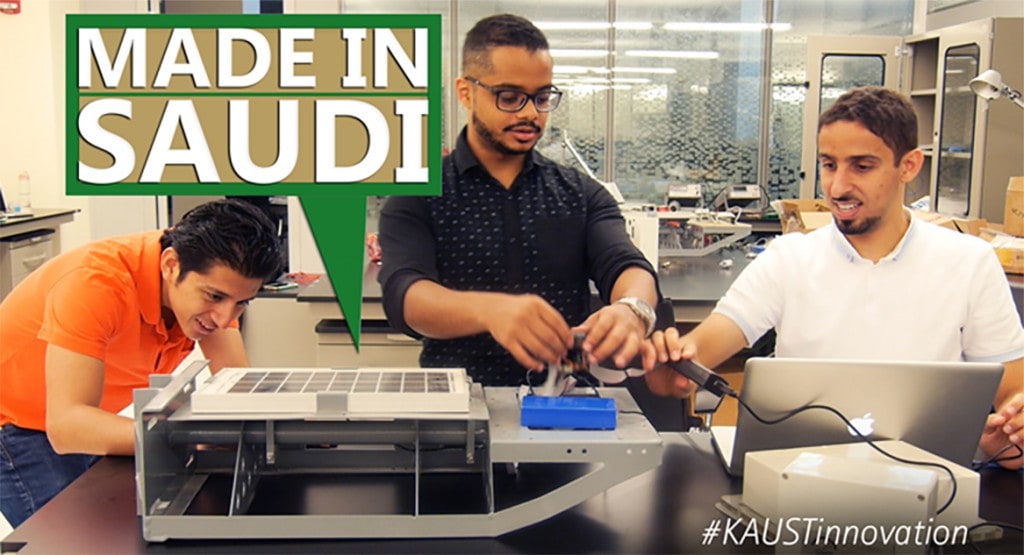As part of its broader innovation and economic development mission, KAUST is expanding its support and training for entrepreneurship to meet the growing interest amongst students (and young people across the Kingdom) in innovation, creativity and design. There are some early signs of success with the incorporation of various new student-led businesses in Saudi Arabia: ‘Made in Saudi Arabia.’
Promoting Student Entrepreneurship in the Kingdom
One of KAUST’s goals is to foster an entrepreneurial mindset and culture amongst its students, researchers and the broader community. In addition to running a large variety of classes, events and other culture-building activities, KAUST has developed accelerator programs that support early-stage student startup teams to explore, test and build their business ideas including the New Ventures Accelerator, open to all teams, and Hikma, which is specifically designed for teams with IP-based business ideas.
KAUST also provides entrepreneurial teams with coaching, mentoring and access to KAUST’s extensive network of Saudi and international partner companies and their network of facilities designed for creative collision and knowledge-sharing.
Over the past few years KAUST has supported 18 student startup teams in sectors ranging from renewable energy, sensor and water desalination technologies to social entrepreneurship. Fifty percent of these startups are based on intellectual property developed at KAUST and one-third have already incorporated in-Kingdom.
These entrepreneurial offerings for student startups at KAUST are helping to contribute to a rise in entrepreneurship in Saudi Arabia and the region that is reshaping, redefining, and helping to diversify its economy. For example, a recent HSBC report reveals that the Middle East has one of the highest proportions of millennial entrepreneurs globally.
Made in Saudi Arabia: New Innovative Start-ups
KAUST accelerators not only assist startups with creating ‘Made in Saudi Arabia’ innovations, but they also provide students with strategic advice, mentorship and outside-the-box perspectives that help them take their idea to the next level.
One example is Amal Aboulhassan, a PhD student at KAUST. She came up with a testing method and computer algorithm that significantly improves and lessens the costs for chemical testing times for solar panels. By attending the KAUST New Ventures Accelerator, Amal was provided with advice on how to create a customer base, hire key staff and fund a software model, which has become a new startup called Material Solver.
Another example is Sadeem, which recently won first place at the KAUST Startup Accelerator Showcase. The team, consisting of Mustafa Mousa, Ahmad Dehwah and Edward Canepa who are all KAUST PhD students in electrical engineering, along with former KAUST professor Christian Claudel, have developed a wireless sensor network that is the world’s first solar-powered urban flood and traffic monitoring system. The Sadeem team has been part of the KAUST Entrepreneurship Center’s Hikma (intellectual property-based) Startup Accelerator program.
A number of student-led social entrepreneurship startups have benefitted from KAUST’s innovation ecosystem. For example, Tekiti, has created an online mobile platform that can link underemployed tradespeople in urban areas with people that need their services. Tekiti team members, currently enrolled in M.S graduate programs at KAUST in Chemical Engineering, Material Sciences and Environmental Sciences, consist of Daniel Corzo, Aniela Zarzar Toraño and Maria Fernanda Nava Ocampo. They have has benefited significantly from accelerator programs and mentorship from KAUST Innovation.
Another social entrepreneurship startup at KAUST, CookHub, started by KAUST PhD students Andrew Yip and Ge Gao and recent PhD graduate (and now KAUST post-doc) Ronell Sicat, has developed a platform that allows talented cooks in urban areas in developing countries to prepare quality food at a time-shared kitchen and fulfill orders from office workers placed online.
KAUST Entrepreneurship Support Gaining Momentum
The early signs are positive. KAUST Innovation received a ‘High Impact Incubator‘ award last year from UBI Global for startup incubation activities in the Kingdom. A number of KAUST-related startups were listed as top 100 innovative startups (including three in the top 10) at a late 2015 Forbes Middle East Event in Riyadh.
KAUST, with its work-live-play ecosystem, is the ideal location for student startups. The University also has progressive IP terms and an environment that puts a strong emphasis on experimenting, collaborating, and strengthening human relationships.

